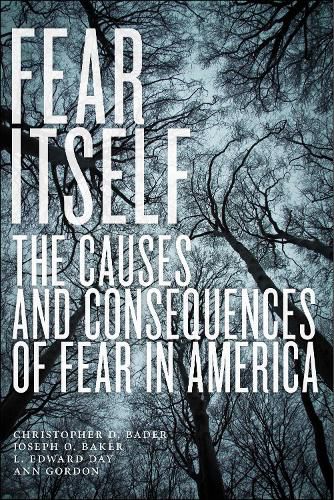Readings Newsletter
Become a Readings Member to make your shopping experience even easier.
Sign in or sign up for free!
You’re not far away from qualifying for FREE standard shipping within Australia
You’ve qualified for FREE standard shipping within Australia
The cart is loading…






An antidote to the culture of fear that dominates modern life
From moral panics about immigration and gun control to anxiety about terrorism and natural disasters, Americans live in a culture of fear. While fear is typically discussed in emotional or poetic terms-as the opposite of courage, or as an obstacle to be overcome-it nevertheless has very real consequences in everyday life. Persistent fear negatively effects individuals’ decision-making abilities and causes anxiety, depression, and poor physical health. Further, fear harms communities and society by corroding social trust and civic engagement. Yet politicians often effectively leverage fears to garner votes and companies routinely market unnecessary products that promise protection from imagined or exaggerated harms.
Drawing on five years of data from the Chapman Survey of American Fears-which canvasses a random, national sample of adults about a broad range of fears-Fear Itself offers new insights into what people are afraid of and how fear affects their lives. The authors also draw on participant observation with Doomsday preppers and conspiracy theorists to provide fascinating narratives about subcultures of fear.
Fear Itself is a novel, wide-ranging study of the social consequences of fear, ultimately suggesting that there is good reason to be afraid of fear itself.
$9.00 standard shipping within Australia
FREE standard shipping within Australia for orders over $100.00
Express & International shipping calculated at checkout
An antidote to the culture of fear that dominates modern life
From moral panics about immigration and gun control to anxiety about terrorism and natural disasters, Americans live in a culture of fear. While fear is typically discussed in emotional or poetic terms-as the opposite of courage, or as an obstacle to be overcome-it nevertheless has very real consequences in everyday life. Persistent fear negatively effects individuals’ decision-making abilities and causes anxiety, depression, and poor physical health. Further, fear harms communities and society by corroding social trust and civic engagement. Yet politicians often effectively leverage fears to garner votes and companies routinely market unnecessary products that promise protection from imagined or exaggerated harms.
Drawing on five years of data from the Chapman Survey of American Fears-which canvasses a random, national sample of adults about a broad range of fears-Fear Itself offers new insights into what people are afraid of and how fear affects their lives. The authors also draw on participant observation with Doomsday preppers and conspiracy theorists to provide fascinating narratives about subcultures of fear.
Fear Itself is a novel, wide-ranging study of the social consequences of fear, ultimately suggesting that there is good reason to be afraid of fear itself.